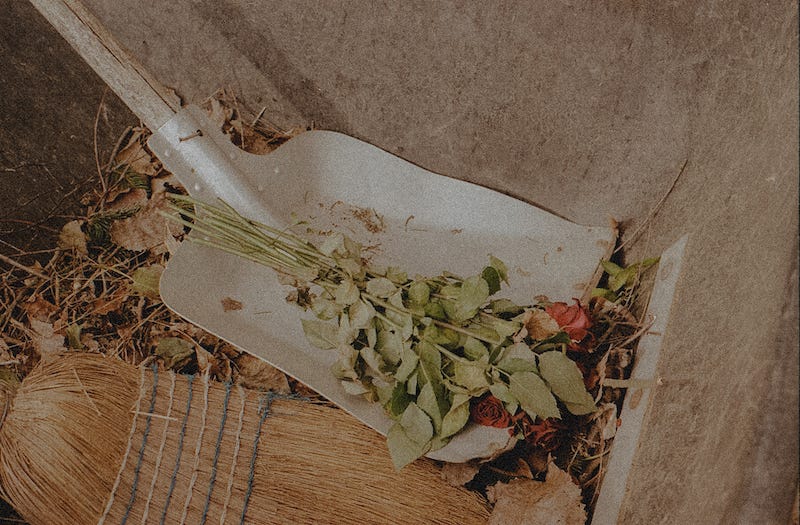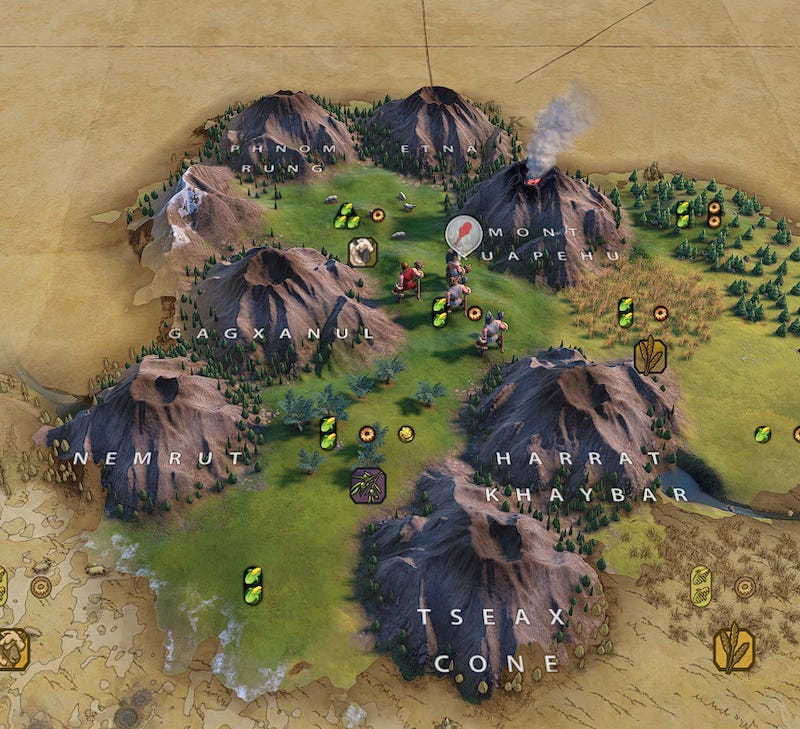Speak Flowers To The World
How We Met Our Neighbour During COVID-19
Another Sunday, Another Naive Weekly - Observations From The Internet Wilderness.

The TV was switched on at 11 pm and continued all night long. The TV wasn’t in our apartment, but its repetitive nonsensical blah blah travelled from our neighbour into our bedroom. It felt like we were stuck in a real-life version of The Sims. When nothing had changed around 4 am, we drowsily flipped our position to distance our ears from the wall, promising our future selves to deal with the noise.
The following day, at exactly 11 pm the TV was switched on again. We hadn’t followed through on our promise to deal with last night’s noise, so it was partly angry, partly embarrassed glances we shared as we asked the rhetorical question; who watches TV in the middle of the night? Because we already knew the answer; our neighbour.
At 2 am it became too much. We were both tired and unable to sleep, so we started to knock on the wall. Maybe no one was at home? Maybe the ‘smart’ TV had switched itself on? Nothing seemed to happen when we knocked, so we knocked again, this time louder. And again. And then the wall responded with a very loud, very firm knock. There definitely was someone at home, and this someone had no intention of tuning down the TV.
By now we were angry and perplexed. I even went online to search for our neighbour’s phone number, but somehow we decided to forfeit. Still unable to sleep we moved our giant mattress to the living room, once again promising our future selves to deal with the noise. And the next day we actually did deal with the situation.
My first instinct was to give our neighbour an angry visit, but somehow it didn’t feel right. So instead we made our neighbour a care package consisting of our favourite candy, flowers, wine, and a note apologising that we had knocked on the wall before knocking on the door. Of course, the note also explained why we had knocked, that the late-night TV watching was disturbing our sleep.
We got the kindest care package in return, including a note explaining that our neighbour is a bar manager, hence she is living in the night, where we live by the day. She moved her TV to another wall, almost eliminating the noise, and invited us for a beer in her bar when the lockdown is over. I think this story could have unfolded in many ways, but I couldn’t have imagined a better way to get to know our bedroom neighbour. One resolution down.
Computer Club

The indisputable best computer game in human history is Civilization. Until May 28, you can download Civilization VI for free. Let me know if we should battle it out!
Reader Interviews
This week I’d like to connect you with Søren Høgh Ipland. Søren is the CEO of the Danish media startup Føljeton, but more importantly, he is one of the brightest minds and most understanding souls I’ve met. Søren is a vivid walker, curious reader, and supporter of wildflowers. Enjoy.
K: What would you be doing if given financial stability and three months of space?
Søren: Start walking south with a bag full of books. Or pitch a tent in a Swedish forest and find some great boulders to climb. If I had to do something productive, I would probably set up interviews with every single interesting editorial content creator and independent journalist I can think of.
K: What emotion is lost online?
Søren: I think most emotions can be conveyed or triggered online. But means of online transmission are just really low bandwidth compared to real life. The thousands of sensations and tiny cues we rely on when interacting with the physical world are reduced to simple streams of information. That’s one reason why people literally feel sick after a day of Zoom meetings. Being a stereotypical millennial, I prefer asynchronous communications but I really try to force myself to go high bandwidth. Switching from connection to conversation, in Sherry Turkle’s terms.
K: What question would you ask a tree?
Søren: Oh, I ask trees about things all the time. I even tried to befriend an ash tree on Assistens Kirkegård during Spring, spending a few hours with it per month. Still waiting for a reply on this one: Does history repeat itself?
K: What was one rabbit hole you recently fell into?
Søren: I’m a serial obsessive. This year, I’ve fallen into a bunch of rabbit holes: Regenerative farming, climbing documentaries, forest music, Earthsea. To name a few. Recently, I’ve been obsessed with David Dobrik and the Vloq Squad.
K: What would be your fictional dream job title?
Søren: Forester of ideas.
K: How do you think about time?
Søren: As a linear progression. Because that’s the basis of the culture I grew up in. But that can be a destructive way of thinking. Up until quite recently, humans probably thought of time as a cycle and not as a left to right upward slope of progress. I’ve been reading about the heathen wheel of the year and seasonal rituals recently and I think that a cyclical understanding of time would cure society (and myself) of many ills.
I think I have what is – tackily – called a growth mindset, meaning that I always try to become smarter and extract value from my time. Sometimes that’s fine, but it’s not wise to decouple growth from other parts of the life cycle: seeding, flowering, death, decay, rebirth.
K: How do you prepare for death?
Søren: Six months ago, I was hospitalized due to high blood pressure which kicked off a few months of severe anxiety about cardiovascular disease. Honestly, up until that point I probably didn’t even realize that death applied to me too. Now it’s clear as day.
I’ve been playing around with Yancey Strickler’s pop-philosophical Bento framework which is basically about forcing yourself to widen the scope of your values. Instead of only focusing on Now Me (“What do I want at this moment?”) when making decisions, he suggests that we also consider the needs of Now Us, Future Us and Future Me. The latter two categories are all about posterity. What kind of world do you want to leave behind? At the end of your life, what kind of person would you like yourself to have been? Whenever I make my weekly plans, I make sure to include some activities that serve those two categories.
Roadside Flowers
Delightful Surprises From The Information Superhighway

Build and nurture your own virtual ecosystem with Orb.farm. And head to r/jarrariums for real-world examples.

Simply the best YouTube video I have seen in a very long time, The Miracle Sudoku.

Donotdrawapenis.com. Make sure to read the about text.

Japan has their own Simone Giertz, she is called Marina Fujiwara and makes wonderful wasted machines like Spoiler Scanner, Get Out of Zoom, and Step on LEGO.
Internet Blackhole
Yes, Websites Really Are Starting to Look More Similar
If you ever have complained about how boring websites look today, this research study provides actual numbers to back your gut feeling. The researchers argue that the culprit is the shared code libraries everyone is using, adding a nice reminder that it is not all for the worse, for example the shared code libraries make it easier for people with disabilities to use the web.Doordash and Pizza Arbitrage
”If capitalism is driven by a search for profit, the food delivery business confuses the hell out of me,” if you are not hooked by now, this article about the absolute insanity of food delivery is not for you. If you are hooked, remember to read the comments too.Media, Regulators, and Big Tech
I have to agree with Ben Thompson when it comes to whether Big Tech should be paying news organizations for showing snippets of their articles; it simply doesn’t make sense, and Thompson explains why.The Hot New Thing in Clubby Silicon Valley? An App Called Clubhouse
Erin Griffith and Taylor Lorenz teamed up for this balanced introduction to the latest social network app to gain the attention of Silicon Valley investors.
Book Club
Since last update I finished Energy at the End of the World, Colorless Tsukuru Tazaki, and Mothering Sunday. The latter wasn’t my taste, but the other two I can recommend. Energy at the End of the World is an impressive book written by ethnographer Laura Watts about energy futures being made at the Orkney Islands. If you are into Donna Haraway you’ll appreciate it, and if you work with innovation you ought to read it.
Murakami’s Colorless Tsukuru Tazaki became a natural extension of Flights, following the ‘colorless’ main character on his pilgrimage journey to discover what is in his empty container.
Naive Weekly
Hi, I’m Kristoffer and you have just read Naive Weekly - Observations From The Internet Wilderness.
Troels is one of the people I know who thinks the most about the meaning of life. This week he surprised me by becoming the eighteenth paying subscriber of this newsletter. Thank you very much Troels. I’m curious to see what path you’ll make.
Last week this newsletter was sent to 543 subscribers. Eighteen people are crazy enough to chip in every month/year to support me making time to write this newsletter: Nikolaj, Ditte, Antal, Søren, Dries, Sarper, Thomas, Mikkel, Aydo, Lukas, Hans, Csongor, Dad, Ida Marie, Yinka, Stine, Troels & Angela!
Photograph by Ana Santl and you can still Buy My Notebook.
<3
Kristoffer

